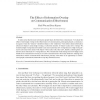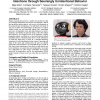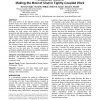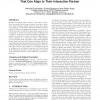3003 search results - page 15 / 601 » Computer-Mediated Communication: Can we Make it Better |
COGSCI
2007
13 years 7 months ago
2007
It makes sense that the more information people share, the better they communicate. To evaluate the effect of knowledge overlap on the effectiveness of communication, participants...
HRI
2009
ACM
14 years 5 days ago
2009
ACM
Human communication involves a number of nonverbal cues that are seemingly unintentional, unconscious, and automatic—both in their production and perception—and convey rich in...
GECCO
2010
Springer
14 years 9 days ago
2010
Springer
Evolutionary methods have been used to repair programs automatically, with promising results. However, the fitness function used to achieve these results was based on a few simpl...
CHI
2004
ACM
14 years 7 months ago
2004
ACM
How much history of the dialogue should a chat client include? Some chat clients have minimized the dialogue history to deploy the space for other purposes. A theory of conversati...
ATAL
2010
Springer
13 years 8 months ago
2010
Springer
Speakers in dialogue tend to adapt to each other by starting to use similar lexical items, syntactic structures, or gestures. This behaviour, called alignment, may serve important...




